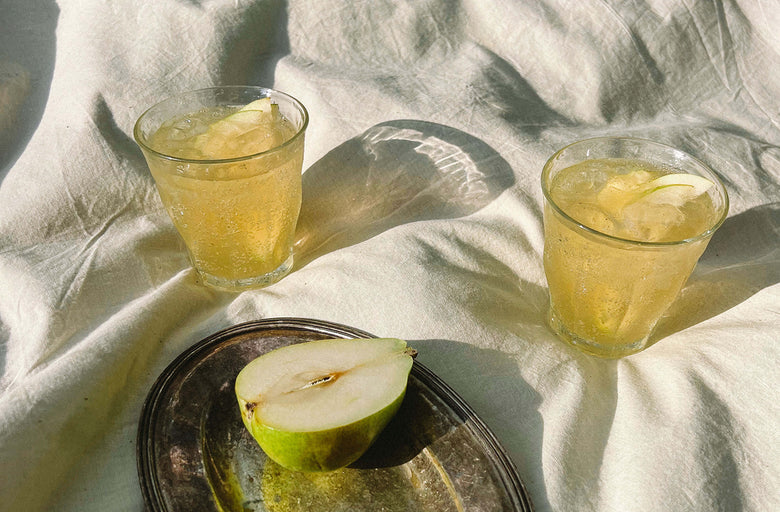Collagen is an ingredient that manages to be both instantly recognizable (there are few who haven’t heard of it in some form) and entirely mysterious. Where is it found in the body? And, perhaps more importantly, when do I start losing it? Should I be looking for it on my skincare labels? What about taking supplements to fortify against its loss? We asked a few herbalists, doctors, and top NYC derms who are fluent in collagen to give us a primer on the topic.
What is collagen exactly?
Collagen is our most plentiful protein and the main ingredient of our connective tissue, which comprises almost the entirety of the body. “If you’re imagining the universe, collagen would be the dark matter,” says New York-based nutrition coach and medical herbalist Daniela Turley. Think skin, cartilage, blood vessels, bones, fascia, tendons, muscles, liver, lungs. “Each of these tissues contain variable amounts of collagen arranged in different ways to aid their function,” she says. Also, Turley adds, that connective tissue, and, ergo, collagen, is not, despite popular opinion, a main component of the hair. Instead, hair is made up mostly of the protein keratin, and collagen forms a thin coating around it and may play a role in the follicle and hair loss.
When do we start losing collagen?
It depends. There are a number of factors that have an impact: smoking (yet another reason to never ever ever), the sun, a diet high in sugar, and, of course, genetics. While each individual will experience loss at a different rate, New York dermatologist Dr. Joshua Zeichner says you can generally expect collagen production in the skin to start slowing down after age 30. “That combined with weakened ability of the skin to protect itself from the environment contributes to the wrinkling and crepey appearance that develops with age,” he adds.
Why your diet makes a difference
When it comes to collagen, the old adage that you are what you eat definitely applies. If you have a soft spot for sweets, your collagen loss may be accelerated. “Consuming a high sugar diet can result in the increased production of Advanced Glycation End products (AGEs), which form when sugar binds to protein,” explains registered dietitian and nutritionist Whitney English Tabaie, MS. “Research has shown that AGEs can damage collagen and contribute to aging including wrinkled skin, weakened muscles, and brittle bones.” If you consume meat and fish, there are options to eat collagen-rich foods. “You will get it in all the areas of the animal where collagen is high like tendons, gut (tripe), pigs trotters, fish skin, and slow-cooked bones (bone broth),” says Turley. But even the most avowed omnivores might be squeamish about some of those foods, especially when considering the diet and source of these creatures. In that case, we turn to the wide swath of plant-based options that, while they don’t contain collagen, will support the biosynthesis of collagen in the body. “Studies show that vitamins C and E help support our body's natural collagen production,” says Tabaie. “My favorite collagen-boosting foods include vitamin C-rich citrus, vitamin E-rich almonds, and beans which contain high amounts of zinc and plant-based protein. A diverse, plant-based diet will provide all of the amino acids, vitamins, and minerals proven to support skin, gut, bone, and joint health.” And, since collagen production is supported by amino acids (proline, glycine, and lysine), registered dietitian nutritionist Stacey K. Leung recommends food packed with them. “Some of the plant-based foods rich in these amino acids are tofu, peanuts, and lentils,” she says. Below, we’ve gathered a shortlist of plant sources with high concentrations of collagen-producing nutrients.
SAKARA POCKET GUIDE to Boosting Collagen Synthesis
Vitamin C (found in)
Goji berries
Citrus
Sweet potatoes
Kiwi
Melon
Cherries
Vitamin E (found in)
Sunflower seeds
Hazelnuts
Avocado
Brazil Nuts
Chard
Spinach
Beet greens
Zinc (found in)
Hemp seeds
Chickpeas
Lentils
Cacao
To supplement or not to supplement
If you’re not getting enough of a collagen bump with your diet, you might consider supplements. Though, as Turley is quick to correct, the body doesn’t actually absorb collagen. “A healthy gut will not absorb collagen but rather its constituent amino acids (proline, glycine, and lysine),” she explains. “This process requires adequate stomach acid, digestive enzymes and no underlying pathology of the small intestine.” Stress can also get in the way of collagen absorption. “If you’re stressed you don’t produce enough digestive juices,” adds Turley. When it comes to marine and animal collagen, there have been some concerns raised about sourcing in regards to the possible presence of heavy metals or mercury so it’s important to do some sleuthing before you buy. Turley likes to recommend, especially for anyone following a plant-based diet, amino acid powders instead (she’s especially a fan of glycine for its additional nervous system-calming qualities). “Amino acids will be more efficacious in building collagen than other ingredients that simply support its production,” she adds. And the next-gen source of non-animal-based collagen that scientists are now working on may be lab-grown yeast and bacteria: an option that would be both safe and more sustainable.
What about topical collagen “fixes”?
If our complexions are experiencing visible collagen loss, many might think that slapping on products with collagen on the ingredient list would do the trick. Nope. “Collagen is a very large molecule, so while it’s moisturizing, it doesn’t penetrate the outer skin layers,” explains Zeichner. Instead, he recommends considering incorporating topical ingredients with proven track records of stimulating collagen. “Retinol is the best-studied ingredient we have over the counter and it works through receptors within the skin cells to directly rev up production of new collagen,” he says. “Vitamin C not only acts as an antioxidant and protects your collagen against free radical damage, but it also serves as a cofactor for healthy production of new collagen. And peptides are messengers that tell our skin cells to function to the best of their ability so when used in skin care they stimulate collagen production too.” But the most critically important step you can take to mitigate any future collagen loss is sunscreen. “UV light causes free radical damage that harms collagen and contributes to premature skin aging, and this is largely preventable with the daily application of sunscreen,” Zeichner adds.
So, here’s your collagen-boosting solution: flood the body with amino acid-rich plant sources; focus on your gut lining integrity by reducing stress, and stimulate your stomach acid with digestive enzymes for maximum absorption. These are all functional methods for activating and supporting this juicy connective tissue. Regardless of age, we all have the power to nourish our systems with the building blocks this elusive tool in our body, designed to keeps us vibrant and moving gracefully.






